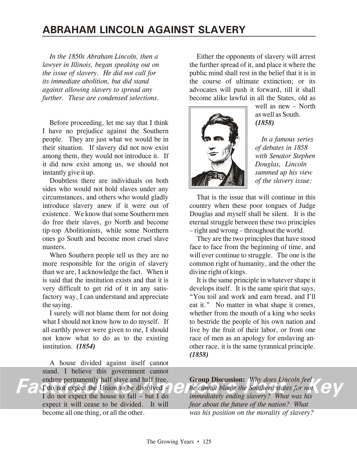| Fasttrack
to America's Past Teacher Key |
|
| Fasttrack
to America's Past Teacher Key |
|
 Page 125 |
Page 125 -
Abraham Lincoln Against Slavery The reading selection These three condensed quotations give insight into Abraham Lincoln's views on the slavery issue in decade before the Civil War. In first, from 1854, Lincoln reveals that he has no clear idea of how slavery could be quickly and easily ended. Certainly he thought slavery was wrong, as his word choices indicate. But he does not blame Southerners as the cause of slavery, and makes it clear that the issue is one for the entire nation, not just one section. In the second quotation, Lincoln delivers his famous declaration that "a house divided against itself cannot stand." The year was 1858, and Lincoln was being nominated by the Republican party to run for the U.S. Senate seat held by Stephen Douglas. The final quotation, from the Lincoln - Douglas debates that same year, Lincoln lays out his view of slavery in clear terms. The struggle against slavery is part of the "eternal struggle... between right and wrong." The picture Abraham Lincoln, without his familiar beard. After he was elected president in 1860, he grew the beard. He said he had been told by a girl on a campaign stop that he would look more distinguished with a beard. Group discussion
questions Lincoln says he cannot
criticize
Southerners for not immediately ending slavery because he "surely will
not blame them for not doing what I should not know how to do myself."
By 1858 Lincoln was clearly troubled by the growing divide in the nation over slavery. He feared that "a house divided against itself cannot stand." He added that he did not expect America to fall. Instead, he predicted that either the spread of slavery would be stopped, and slavery itself put on a course to eventual abolition, or else slavery would become lawful in all the states. During his debate in
1858 with Stephen
Douglas, Lincoln declared slavery to be a clear-cut moral issue, part
of
the "eternal struggle" between "right and wrong."
|
|
Copyright Notice
Copyright 2018 by David Burns. All rights reserved. Illustrations and reading selections appearing in this work are taken from sources in the public domain and from private collections used by permission. Sources include: the Dover Pictorial Archive, the Library of Congress, The National Archives, The Hart Publishing Co., Corel Corporation and its licensors, Nova Development Corporation and its licensors, and others. Maps were created or adapted by the author using reference maps from the United States Geological Survey and Cartesia Software. Please see the home page for this title for more information. |